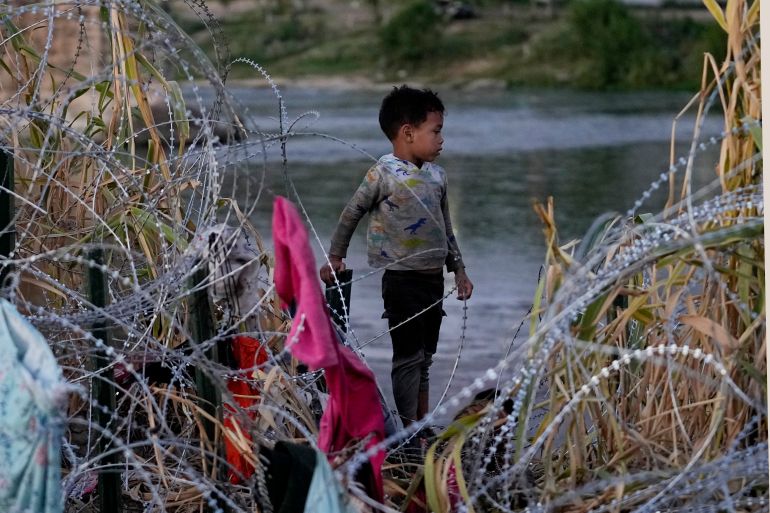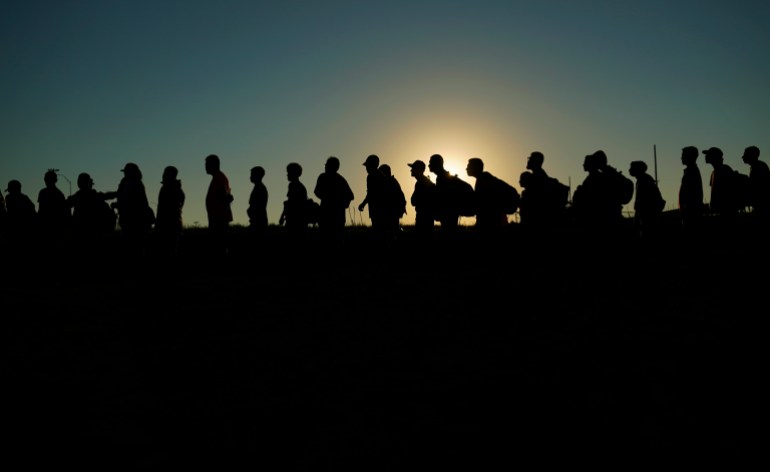Texas cities struggle to address influx of arrivals along US-Mexico border
The administration of US President Joe Biden has reached out to Mexico for help confronting the spike in migration.

The administration of United States President Joe Biden is facing pressure to address a recent swell of arrivals at the country’s southern border as local officials warn their resources may soon reach “breaking point”.
On Monday, the city council in El Paso, Texas, unanimously approved the purchase of a former middle school to help accommodate overflow from refugee shelters.
Keep reading
list of 3 itemsUS judge orders Texas to remove controversial border buoys from Rio Grande
‘Preyed upon’: Texas sheriff opens probe into US migrant flights
Deputy City Manager Mario D’Agostino said the city was receiving approximately 2,000 arrivals per day as migrants and asylum seekers make their way across the US-Mexico border.
“It’s foreseeable that we’re going to see a large influx over the next few days as CBP [Customs and Border Protection] processes them and they come into the system,” D’Agostino said on Saturday.
In his remarks, El Paso Mayor Oscar Leeser warned that the influx could strain what the city is capable of handling.
“The city of El Paso only has so many resources,” he said over the weekend. “We have come to what we look at [as] a breaking point right now.”

The spike in arrivals at the southern border has renewed scrutiny of the Biden administration, which had, until recently, touted a drop in arrests along the US’s southwest border.
In May, the administration implemented new restrictions on irregular border crossings, including penalties like a five-year ban on reentry into the US and possible criminal prosecution.
The rollout of those policies coincided with a decline in crossings. From May to June, arrests along the southwest border tumbled from 206,703 to 144,570, a 30-percent drop.
But those numbers have since ticked back up, with US Border Patrol documenting 232,972 apprehensions in August.
Experts warn those numbers may continue to rise. In July, Panama registered a record number of migrants and asylum seekers travelling north through the Darien Gap, a dangerous stretch of jungle connecting South and Central America.
More than 248,901 people were documented navigating the jungle in the first half of this year, blowing past the previous record set for the whole of 2022.
Late on Sunday, leaders with the US Customs and Border Protection agency announced they had met with state and federal officials from Mexico to “discuss joint efforts to address increased migration encounters”.
In recent months, the US has also set up “safe mobility” centres in countries like Guatemala and Colombia in an attempt to deter migrants and asylum seekers from making the journey north.
The centres are designed to channel prospective migrants towards “legal pathways” for arriving in the US.
But critics, particularly in the Republican Party, have argued those measures have not been successful in stemming the flow of migration.
On Monday, one of those critics, Texas Representative Tony Gonzales, visited Eagle Pass, a border city of 28,255 that declared a state of disaster last week amid the migration influx.
“Just left the migrant processing center in Eagle Pass where Border Patrol has 4,000+ in custody. This is FOUR TIMES their holding capacity and it’s happening EVERY DAY,” Gonzales posted on social media afterwards.
Reporting on Monday afternoon from the banks of the Rio Grande in Eagle Pass, Al Jazeera’s Heidi Zhou-Castro described how many of the arrivals hailed from Venezuela, where they escaped dire poverty and political turmoil.
“This is a very emotional moment for many. We saw some praying. We saw some hugging, kissing their children, kneeling down to touch the soil with their fingers for the first time,” Zhou-Castro said.
But, she added, treacherous conditions along the border made the journey difficult for some.
“Just earlier a man collapsed after emerging from these wires. The heat exhaustion here is a real threat,” Zhou-Castro explained. “These are people who haven’t had water — some of them overnight until now — and were just desperately begging for this assistance, to be allowed to cross through this razor wire.”
She said that she observed US border patrol agents trim back some of the razor wire that the state of Texas placed on the river banks, in order to ensure people could pass without injury. Other agents took boats onto the river to pluck children out of the water and bring them to safety.
“You see people getting their backpacks, clothing caught in this razor wire that is indeed very sharp,” Zhou-Castro said, as a group of people behind her passed through a gap in the thicket of wire.
Texas Governor Greg Abbott, however, has decried some of those efforts to make the crossing safer, pledging to replace any razor wire cut by federal agents.
“Texas National Guard soldiers are on the ground in Eagle Pass replacing razor wire the Biden Admin cut,” Mike Banks, an adviser to Abbott, posted on social media last week.
Earlier this month, the International Organization for Migration, a United Nations agency, named the US-Mexico border the most dangerous land route for migrants and asylum seekers, with approximately 1,457 deaths and disappearances documented last year.